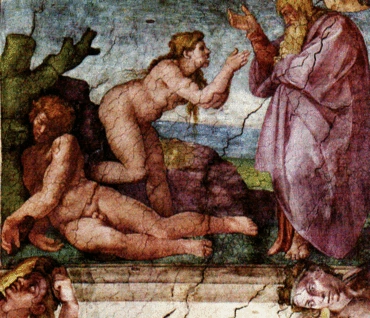Explanation of Genesis 2:24
Door Brian David

This verse uses "man" in a masculine sense, meaning thoughts and ideas in the intellect. Leaving father and mother means leaving the former state of internal spiritual awareness, and cleaving to his wife means being conjoined instead with the external awareness of life. Being one flesh means that the internal of the man and the external of the wife were together as one in life.
The people of the Most Ancient Church wanted to live from themselves. So the Lord created in them the capacity to feel that, though it meant they had to descend from the spiritual awareness they had enjoyed. But they weren't bad people; they still loved the Lord and wished to be good. They just wanted to feel that they were doing it themselves. By having the man cleave to the wife, the Lord allowed the people's higher internal states to enter into their external lives and be part of that sense of self, so they could indeed love the Lord as if from themselves.
(Referenties: Arcana Coelestia 160, 161, 162)
Arcana Coelestia #162
162. All the laws of truth and right stem from celestial sources, that is, from the order of life as it exists with the celestial man; for the whole of heaven is the celestial man, because the Lord alone is the Celestial Man and the All of every single thing in heaven and in the celestial man. This is why they are called celestial. Since every law of truth and right comes down from heavenly sources, that is, from the order of life as it exists with the celestial man - above all the law that concerns marriages - the heavenly marriage ought to be the source of and pattern for all marriages on earth. This marriage consists of one Lord and one heaven, or one Church whose head is the Lord. The consequent law for marriages is that there must be one man (vir) and one wife. When this is the case they represent the heavenly marriage, and are a model of the celestial man. This law was not merely revealed to men (vir) of the Most Ancient Church, but was also inscribed on their internal man. Consequently a man (vir) in those times had but one wife, and they formed one house. But when their descendants fell away from being internal men and became external they began to marry several wives.
[2] Because the men (vir) of the Most Ancient Church by their marriages represented the heavenly marriage, conjugial love was to them like heaven and heavenly happiness. But when that Church went into decline they no longer perceived any happiness in conjugial love, but only in the pleasure obtained from having several wives, which is characteristic of the external man. This the Lord calls 'hardness of heart', on account of which Moses allowed them to marry several wives, as the Lord Himself teaches,
On account of your hardness of heart Moses wrote you this commandment, but from the beginning of creation God made them male and female. For this reason man (homo) will leave his father and mother and cling to his wife, and the two will be as one flesh. So they are no longer two, but one flesh. What therefore God has joined together man (homo) must not put asunder. Mark 10:5-9.






